现代大学生英语 diogenes第欧根尼 戴奥真尼斯 犬儒主义
Diogenes and Alexander 翻译
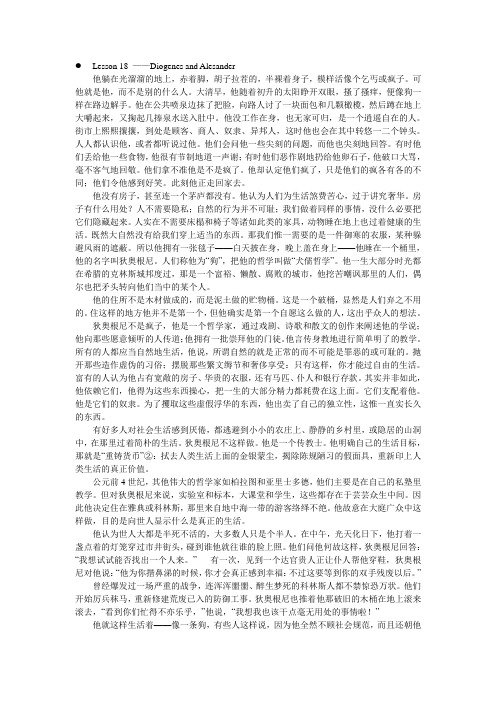
Lesson 18 ——Diogenes and Alesander他躺在光溜溜的地上,赤着脚,胡子拉茬的,半裸着身子,模样活像个乞丐或疯子。
可他就是他,而不是别的什么人。
大清早,他随着初升的太阳睁开双眼,搔了搔痒,便像狗一样在路边解手。
他在公共喷泉边抹了把脸,向路人讨了一块面包和几颗橄榄,然后蹲在地上大嚼起来,又掬起几捧泉水送入肚中。
他没工作在身,也无家可归,是一个逍遥自在的人。
街市上熙熙攘攘,到处是顾客、商人、奴隶、异邦人,这时他也会在其中转悠一二个钟头。
人人都认识他,或者都听说过他。
他们会问他一些尖刻的问题,而他也尖刻地回答。
有时他们丢给他一些食物,他很有节制地道一声谢;有时他们恶作剧地扔给他卵石子,他破口大骂,毫不客气地回敬。
他们拿不准他是不是疯了。
他却认定他们疯了,只是他们的疯各有各的不同;他们令他感到好笑。
此刻他正走回家去。
他没有房子,甚至连一个茅庐都没有。
他认为人们为生活煞费苦心,过于讲究奢华。
房子有什么用处?人不需要隐私;自然的行为并不可耻;我们做着同样的事情,没什么必要把它们隐藏起来。
人实在不需要床榻和椅子等诸如此类的家具,动物睡在地上也过着健康的生活。
既然大自然没有给我们穿上适当的东西。
那我们惟一需要的是一件御寒的衣服,某种躲避风雨的遮蔽。
所以他拥有一张毯子——白天披在身,晚上盖在身上——他睡在一个桶里,他的名字叫狄奥根尼。
人们称他为“狗”,把他的哲学叫做“犬儒哲学”。
他一生大部分时光都在希腊的克林斯城邦度过,那是一个富裕、懒散、腐败的城市,他挖苦嘲讽那里的人们,偶尔也把矛头转向他们当中的某个人。
他的住所不是木材做成的,而是泥土做的贮物桶。
这是一个破桶,显然是人们弃之不用的。
住这样的地方他并不是第一个,但他确实是第一个自愿这么做的人,这出乎众人的想法。
狄奥根尼不是疯子,他是一个哲学家,通过戏剧、诗歌和散文的创作来阐述他的学说;他向那些愿意倾听的人传道;他拥有一批崇拜他的门徒。
10-Unit-4-Diogenes-and-Alexander-教案讲义
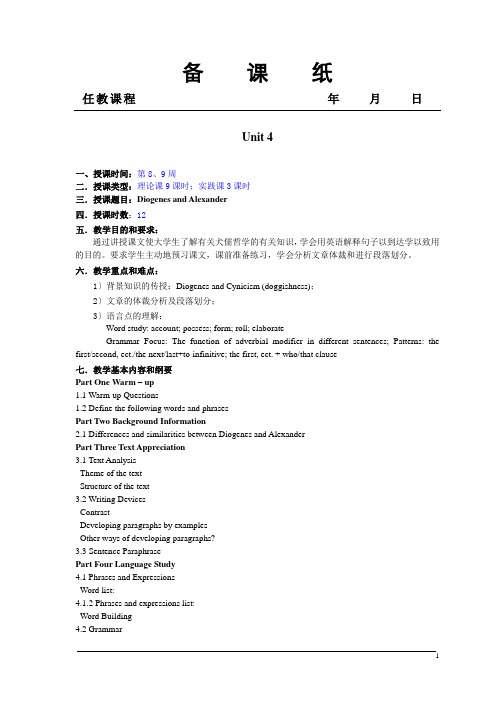
任教课程年月日Unit 4一、授课时间:第8、9周二.授课类型:理论课9课时;实践课3课时三.授课题目:Diogenes and Alexander四.授课时数:12五.教学目的和要求:通过讲授课文使大学生了解有关犬儒哲学的有关知识,学会用英语解释句子以到达学以致用的目的。
要求学生主动地预习课文,课前准备练习,学会分析文章体裁和进行段落划分。
六.教学重点和难点:1〕背景知识的传授:Diogenes and Cynicism (doggishness);2〕文章的体裁分析及段落划分;3〕语言点的理解:Word study: account; possess; form; roll; elaborateGrammar Focus: The function of adverbial modifier in different sentences; Patterns: the first/second, ect./the next/last+to-infinitive; the first, ect. + who/that clause七.教学基本内容和纲要Part One Warm – up1.1 Warm-up Questions1.2 Define the following words and phrasesPart Two Background Information2.1 Differences and similarities between Diogenes and AlexanderPart Three Text Appreciation3.1 Text AnalysisTheme of the textStructure of the text3.2 Writing DevicesContrastDeveloping paragraphs by examplesOther ways of developing paragraphs?3.3 Sentence ParaphrasePart Four Language Study4.1 Phrases and ExpressionsWord list:4.1.2 Phrases and expressions list:Word Building4.2 Grammar任教课程年月日ObjectPart Five Extension5.1 Group discussion八、教学方法和措施本单元将运用黑板、粉笔、多媒体网络辅助教学设备等教学手段,主要采用以学生为主体、教师为主导的任务型、合作型等教学模式,具体运用教师讲授法、师生讨论、生生讨论等方法进行教学。
Unit 4 Diogenes and Alexander教学教材
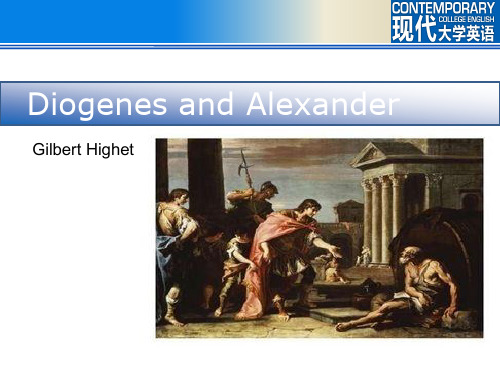
Background
➢ The first philosopher to outline these themes was Antisthenes (安提西尼), a pupil of Socrates in the late 5th century BC.
➢ He was followed by Diogenes of Sinope. ➢ Diogenes took Cynicism to its logical extremes and ➢ was followed by Crates of Thebes (克拉特斯). ➢ It disappeared in the late 5th century ➢ although some have claimed that early Christianity adopted
Diogenes and Alexander
Gilbert Highet
Diogenes and Alexander Unit 4
Diogenes
Background
Alexander
Background
➢ Diogenes (412 – 324 BC): Greek cynic philosopher ➢ lived in a tub ➢ nicknamed “the dog” ➢ emphasized self-sufficiency and need for natural, uninhibited
Background
➢ Plato (429 – 347 BC): Athenian philosopher, a disciple of Socrates and the teacher of Aristotle.
Unit_4_Diogenes_and_Alexander
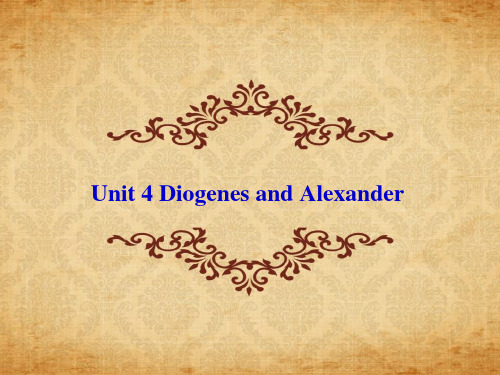
For understandable reasons, Diogenes has never had a large following. However, Diogenes has never been forgotten either, especially in modern times.
…….and washed them down with a few handfuls of water scooped from the spring. (para.1) A few handfuls of -ful here is used as a noun suffix. e.g. a few mouthfuls of / a spoonful of honey/a glassful of beer.
Unit 4 Diogenes and Alexander
Author: Gilbert Highet
Gilbert Highet (1906-1978) Scholarly and critical writers Born in Scotland and became American citizen Educated in Scotland and Oxford
II. Diogenes' meeting with Alexander(paras.11-17)
A. Alexander's presence in Corinth.(para.11) B. His motivation for visiting Diogenes.(paras.14-17) C. His brief exchange with Diogenes(paras.14-17)
综英 第欧根尼 2

From:Wikipedia
雅典学园
Brief Introduction
Diogenes Era: Ancient philosophy Region: Western Philosophy School(学派): Greek philosophy, Cynicism(犬儒主义) Main interests: Asceticism(禁欲主义) Cynicism (犬儒主义) Notable ideas: Cynic犬儒学派的philosophy
Born Birthday
Father
Greek colony殖民地 of Sinope on the south coast of the Black Sea 412 BC or 404 BCE
Hicesias, a banker
Diogenes The banking business aiding his father
Instead of being troubled about the true nature of evil, people merely rely on customary interpretations
His slave:Manes Abandoned him
"If Manes can live without Diogenes, why not Diogenes without Manes?"
Philip II all Corinth Diogenes
marching on the town bustle 喧闹,忙碌 having nothing to do rolling his tub energetically up and down
犬儒主义
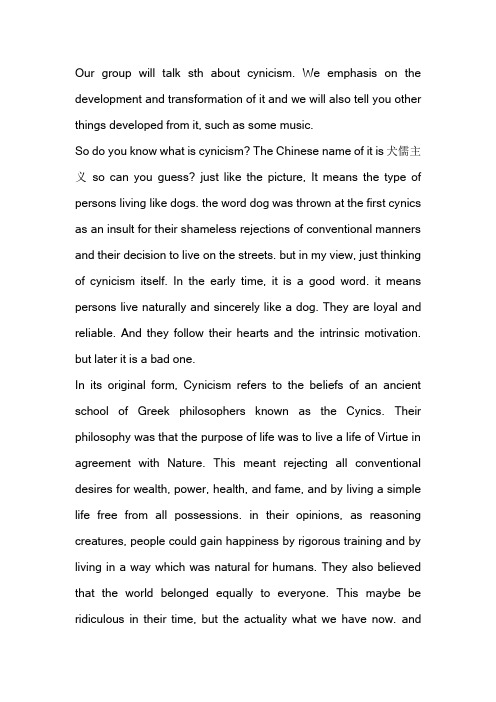
Our group will talk sth about cynicism. We emphasis on the development and transformation of it and we will also tell you other things developed from it, such as some music.So do you know what is cynicism? The Chinese name of it is犬儒主义so can you guess? just like the picture, It means the type of persons living like dogs. the word dog was thrown at the first cynics as an insult for their shameless rejections of conventional manners and their decision to live on the streets. but in my view, just thinking of cynicism itself. In the early time, it is a good word. it means persons live naturally and sincerely like a dog. They are loyal and reliable. And they follow their hearts and the intrinsic motivation. but later it is a bad one.In its original form, Cynicism refers to the beliefs of an ancient school of Greek philosophers known as the Cynics. Their philosophy was that the purpose of life was to live a life of Virtue in agreement with Nature. This meant rejecting all conventional desires for wealth, power, health, and fame, and by living a simple life free from all possessions. in their opinions, as reasoning creatures, people could gain happiness by rigorous training and by living in a way which was natural for humans. They also believed that the world belonged equally to everyone. This maybe be ridiculous in their time, but the actuality what we have now. andthey also think suffering was caused by false judgments of what was valuable and by the worthless customs and conventions which surrounded society. They required freedom and frankness, which politics disallowed.For example, there are some typical philosophers in the ancient time.Diogenes is considered one of the founders of Cynicism.Many anecdotes of Diogenes refer to his dog-like behavior, and his praise of a dog's virtues. Diogenes said:"I am Diogenes the Dog. I nuzzle the kind, bark at the greedy and bite scoundrels.Diogenes believed human beings live artificially and hypocritically and would do well to study the dog. As for a dog, it perform natural body functions in public with ease, a dog will eat anything, and make no fuss about where to sleep. Dogs live in the present without anxiety, and have no use for the pretensions of abstract philosophy. In addition to these virtues, dogs are thought to know who is friend and who is foe.There is a story about Diogenes, you can also find it in the book.Diogenes lived in a tub on the streets of Athens. One day, conqueror of half the civilize world, Alexander the Great, saw Diogenes sitting in this tub in the sunshine. So the king, surroundedby his countries, approached Diogenes and said,” I am Alexander the Great.” The philosopher replied rather contemptuously,” I am Diogenes, the Cynic.” Alexander then asked him if he could help him in any way." Yes,” shot back Diogenes," don't stand between me and the sun.” A surprised Alexander then replied quickly,” If I were not Alexander, I would be Diogenes."This is what cynicism perform in the early time. This thought can be found in many parts of the world. For example, in china, the persons of Chinese Taoism also held the similar thoughts. Chinese Taoism emphasizes living in harmony with the Tao. And tao is natural, ,eternal, nameless, and indescribable. It is the beginning of all things and the way in which all things pursue their course.There is a typical philosopher called Chuang Tzu. Chang Tzu advocates that men distance themselves from the traditional prestige and honor of worldly life, and think about what it means to simply live.There is a story about himZhuang Zhou onceinto a butterfly, flying in the air, like he free butterfly.In his dream he was amused withoutonly something in his dream. After a he up andand couldn't tell it was he turned into a butterfly in his dream or a butterfly turned into him.So you can see, cynicism and Chinese Taoism are alike in some parts.However, as the time flying, cynicism in the modern life is extremely different from the early meanings. And my partners will introduce you more information.。
大学英语Book3 U4 Diogenes and Alexander
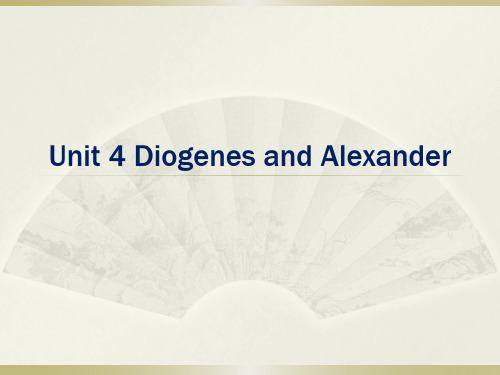
Unit 4 Diogenes and Alexander
Objectives
To learn the words and phases To know more about the Western philosophers
and their doctrines To learn the writing skills (eg. contrast) to know more about the Chinese philosophers
Having no work to go to and no family to provide for, he was free. (para.1)
Provide for a family = feed a family = raise a family
…..he had strolled through it for an hour or two (para.1) v. To walk somewhere in a slow and relaxed way
--"I am Alexander, the great king." --"I am Diogenes the dog"
Diogenes was using his nickname to show his contempt for the titles others valued.
and make comments on their doctrines
procedures
New words learning Presentation Questions about text comprehension Text analysis
犬儒学派

犬儒主义(Cynicism)是个外来词,中文里本来没有现成的对应词汇,通常将它理解为讥诮嘲讽,愤世嫉俗, 玩世不恭。
犬儒主义是古希腊的一个哲学流派,其代表人物是西诺普的狄奥根尼。这派哲学主张清心寡欲,鄙弃俗世的 荣华富贵,力倡回归自然(这使人想起老庄哲学,想起某些魏晋名士)。据说狄奥根尼本人住在一个桶里(又有 一说是住在瓮里),以讨饭为生。有人讥笑他活得象条狗,他却不恼。“犬儒”之称由此得名。关于狄奥根尼, 有段故事很著名,一天,亚历山大御驾亲临,前来探望正躺在地上晒太阳的狄奥根尼,问他想要什么恩赐;狄奥 根尼回答说:“只要你别挡住我的太阳。
学派创立
安提斯泰尼在晚年对正统的哲学丧失了信心,当他已不再年轻,鄙弃从前所重视的东西,放弃了上层阶级的 生活模式,而去过简朴的生活,不受各种习俗和规定的限制,除了纯朴的善良而外,他不愿意要任何东西,并希 望希腊回复到原始社会。
受到这种思想的启发,狄奥根尼(安提斯泰尼的弟子)几乎裸身并且没有携带任何补给便周游了整个希腊, 享受了阳光、温暖等一切自然的恩赐,并且聚集了几千个皈依他的思想的人,并向他们讲述这个社会是多么值得 讽刺。
背景介绍
犬儒犬儒学派因其创始人安提斯泰尼(Antisthenes)在一个名叫居诺萨格(Kunosarges)的体育场中讲学 而得名。因为Kuno就是希腊语“狗”的意思。同时,“犬儒”这名称也标志着他们的生活方式。准确的来说,犬 儒学派就是对世界的不信任和对任何事物抱消极态度的学派。
安提斯泰尼是苏格拉底的弟子,约长于柏拉图二十岁。安提斯泰是一个非常引人注意的人物,在某些方面其 有似于托尔斯泰。直到苏格拉底死后,他还生活在苏格拉底贵族弟子们的圈子里,并没有表现出任何非正统的征 象来。
- 1、下载文档前请自行甄别文档内容的完整性,平台不提供额外的编辑、内容补充、找答案等附加服务。
- 2、"仅部分预览"的文档,不可在线预览部分如存在完整性等问题,可反馈申请退款(可完整预览的文档不适用该条件!)。
- 3、如文档侵犯您的权益,请联系客服反馈,我们会尽快为您处理(人工客服工作时间:9:00-18:30)。
Diogenes------in
Athens
After being exiled, he moved to Athens to debunk拆穿 cultural conventions. Diogenes modeled himself on the example of Hercules. He believed that virtue was better revealed in action than in theory. He used his lifestyle and behavior to criticize the social values and institutions of what he saw as a corrupt society. He declared himself a cosmopolitan四海为家者,世界 主义者.
Diogenes------death
There are conflicting accounts of Diogenes„ death. He is alleged 宣称 variously to have held his breath; to have become ill from eating raw octopus章鱼; or to have suffered an infected dog bite. The Corinthians erected to his memory a pillar on which rested a dog of Parian地名:帕 罗斯marble.
Two years later in 338 BC, Philip gave his son a commanding post among the senior generals as the Macedonian马其顿 army invaded Greece. At the Battle of Chaeronea克罗尼亚 the Greeks were defeated and Alexander displayed his bravery by destroying the elite Greek force. Some ancient historians recorded that the Macedonians won the battle thanks to his bravery.
Diogenes------in Sinope
• Nothing is known about his early life except that his father Hicesias was a banker. It seems likely that Diogenes was also enrolled into the banking business aiding his father. At some point (the exact date is unknown) Diogenes a in a scandal involving the adulteration or defacement of the currency货币掺假或污损, and Diogenes was kicked out of the city.
Diogenes------in Corinth
• According to a story, After being captured by pirates and sold into slavery, Diogenes eventually settled in Corinth. There he passed his philosophy of Cynicism to Crates克拉底, who taught it to Zeno季诺, who fashioned it into the school of Stoicism斯多 亚学派, one of the most enduring schools of Greek philosophy.
Alexander
He spent his childhood watching his father transforming Macedonia into a great military power, winning victory after victory on the battlefields throughout the Balkans巴尔干半岛.
未公开私照
• The next photo contains adult contents, under twenty years of age, are not allowed to enter. • 下一张图片涉及成人内容,未满二十周岁 的小朋友,严禁进入!
Alexander
Alexander the Great, (July 20, 356 BC - June 10, 323 BC), also known as Alexander III, king of Macedon (336-323 BC), and conqueror of the Persian波斯 Empire, is considered one of the greatest military军队 geniuses天 赋 of all times and one of the most successful Ancient Greek military commanders in history.
He was born in Sinope 斯诺普, an Ionian爱奥尼亚colony殖民地 on the Black Sea, in 412 BC or 404 BC and died at Corinth科林斯 in 323 BC. A Greek philosopher One of the founders of Cynic philosophy
• Alexander succeeded his father to the throne王 位 in 336 BC after Philip was assassinated暗杀. Upon Philip„s death, Alexander inherited a strong kingdom and an experienced army. He was awarded the generalship of Greece, and used this authority to launch his father‟s military expansion plans. In 334 BC he invaded Persianruled Asia Minor小亚细亚 and began a series of campaigns that lasted ten years. Alexander broke the power of Persia in a series of decisive battles. He subsequently后来 overthrew推翻 the Persian king Darius III达瑞耶斯三世 and conquered the entirety of the Persian Empire. At that point his empire stretched from the Adriatic Sea亚得里亚海 to the Indus River印度河.
• 他结交工人,并且穿得和工人一样。他进 行露天讲演,他所用的方式是没有受过教 育的人也都能理解的。 • 一切精致的哲学,他都认为毫无价值;凡 是一个人所能知道的,普通的人也都能知 道。他信仰“返于自然”,并把这种信仰 贯彻得非常彻底。他主张不要政府,不要 私有财产,不要婚姻,不要确定的宗教。 他并不是一个严格的苦行主义者,但是他 鄙弃奢侈与一切人为的对感官快乐的追求。 他说“我宁可疯狂也不愿意欢乐”。
• Seeking to reach the “ends of the world and the Great Outer Sea”, he invaded India in 326 BC, but was eventually forced to turn back at the demand of his troops. Alexander died in Babylon巴比伦 in 323 BC, without executing a series of planned campaigns that would have begun with an invasion of Arabia阿 拉伯. In the years following his death a series of civil wars tore his empire apart, resulting in several states ruled by the Diadochi迪亚多 奇 – Alexander„s surviving generals and heirs继承人.
Diogenes -----in Corinth
Diogenes made a virtue of poverty. He begged for a living and slept in a tub in the marketplace. He became notorious声名狼藉 for his philosophical stunts表演,噱头 such as carrying a lamp in the daytime, claiming to be looking for an honest man. He publicly mocked Alexander. He embarrassed Plato, disputed his interpretation演出 of Socrates苏 格拉底 and sabotaged搞破坏 his lectures.
